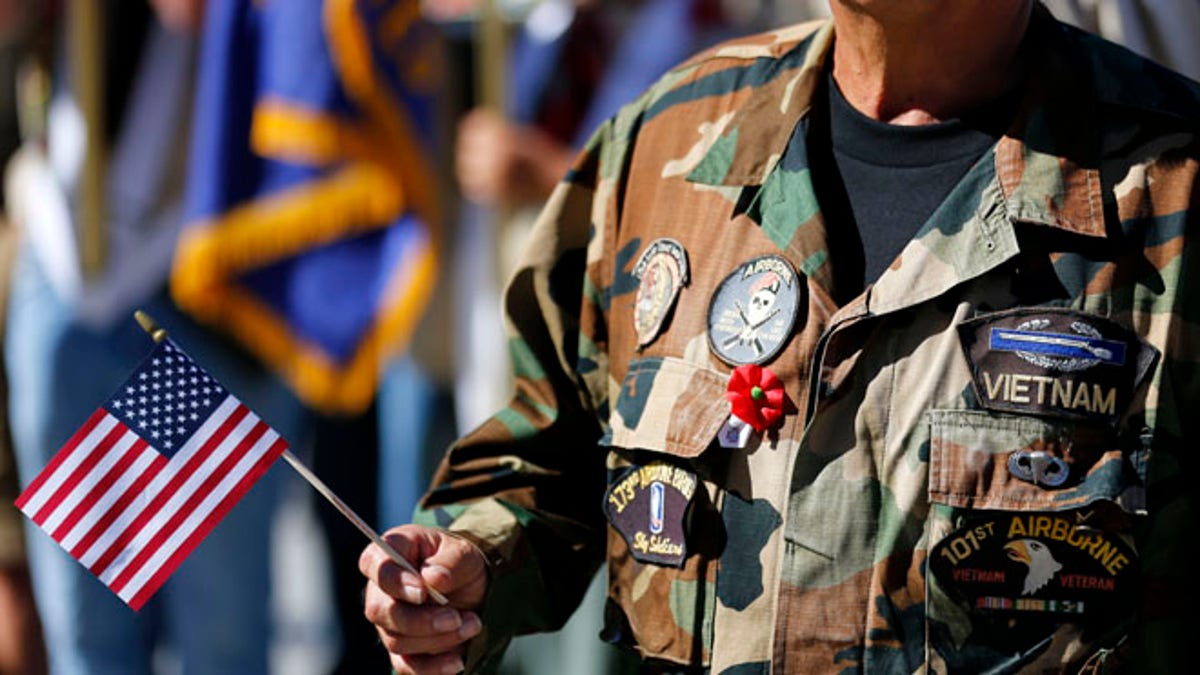
Nov. 11, 2013: A Vietnam veteran holds an American flag as he marches during the annual Veterans Day Parade in San Diego, Calif. (Reuters)
On November 11our nation is paying tribute to veterans across the country. Throughout our nation’s history, veterans have fought in civil and world wars, assisted communities during natural disasters and protected American citizens in their times of need.
Veterans Day is also an opportunity for us to think about what more we can do to support today’s 21.8 million American veterans as they come home from the battlefield to settle back in to civilian and professional life, or enjoy their retirement years.
Active duty has left some of our bravest service personnel with very visible injuries that will affect them the rest of their lives. Some require intense rehabilitation and years of physical therapy. But too little time is spent talking about the two most common battlefield injuries—tinnitus and hearing loss.
LIFE FOR OUR VETERANS (AND OUR MILITARY) COULD BE MUCH DIFFERENT SOON
That’s why we must return the favor. I encourage you to talk to your loved veteran about getting their hearing tested, starting with a simple, 5-minute Beltone hearing test on www.beltone.com.
Many of us don’t realize that proximity to something like a noisy subway for just 15 minutes a day can cause permanent hearing damage.
Think about this in context of the battlefield environment. Many veterans who served in Iraq and Afghanistan, for example, were exposed to gunfire and blasts during their service, both of which can be devastating to unprotected ears. While there is a great deal of research being conducted to learn the varied effects of battlefield explosions on the brain, including traumatic brain injury (or TBI), we do know that among these effects are hearing loss. Hearing loss can even occur in veterans when there is no obvious physical injury.
Hearing loss not only makes it harder to communicate with our friends and family, it can make our professional lives more challenging too, leading to isolation, stress on relationships and even lower incomes.
Today, the global hearing impaired population is approximately 5.3 percent of the world’s population—just over 360 million people—and that number is expected to triple by the year 2030.
Additionally, according to the Centers for Disease Control and Prevention (CDC), veterans are 30 percent more likely to have a severe hearing impairment than nonveterans.
Further, veterans who served in the United States or overseas from September 2001 through March 2010, are four-times more likely than nonveterans to have a severe hearing loss.
Although hearing loss is usually permanent, it can be offset with hearing aids. That’s why the CDC suggests as a result of these findings, that there is a need for increased emphasis on improving military hearing health.
Unfortunately, there are still many hurdles to jump. But that’s where we all can help. The psychological scars from the horrors of war—and a fear of being labeled disabled—leave many veterans hesitant to seek help. That holds true for hearing loss as well. Only 21 percent of people with hearing loss in the United States are wearing hearing aids—leaving a staggering 79 percent of hearing impaired people living without hearing assistance.
That’s why I implore you to encourage a veteran you know to get their hearing tested. Sometimes difficulty hearing can stem from a temporary issue, excess ear wax, an infection or a perforated ear drum. These issues can be corrected medically, without the need for hearing aids.
However, it’s better to have their hearing tested by a professional who can tell the difference between temporary hearing loss and permanent hearing loss. A simple, 5-minute hearing quiz can tell your loved one if their hearing should be checked.
Beltone—a leader in hearing aids for the past 76 years—recommends that everyone over age 50, especially veterans, have a baseline hearing screening.
A proper hearing exam uses sounds, tones and speech to test hearing. It must be performed in the right environment and analyzed correctly. Results, which are plotted on an audiogram, will indicate whether or not you or your loved one are a candidate for hearing aids.
So thank and salute your local veterans, and talk to them about their hearing health. Encourage them to take the hearing quiz this Veteran’s Day. Together, we can take steps toward returning the favor for their service to this country by helping them to live their lives to the fullest.
